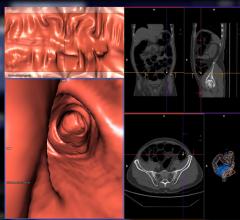December 1, 2007 - Visage Imaging Inc., a wholly owned subsidiary of Mercury Computer Systems Inc., and Medicsight have partnered to jointly develop a CT colonography solution which will be fully integrated with the Visage Thin Client/Server platform designed to provide hospitals and imaging centers with easy deployment and enhanced accessibility to CT colonography.
Visage Imaging’s PACS and advanced visualization solutions are reportedly capable of displaying and processing the ever-increasing amounts of 2D, 3D, and 4D data efficiently on standard computers connected through LAN, WAN or the Internet. The planned CT colonography (CTC) application will be fully integrated into this platform, providing server-based performance and consistent data access across the entire healthcare enterprise. Radiologists and clinicians can use of the CTC combined with Medicsight CAD, in both second and concurrent reading paradigms; as well as for distributing, documenting and sharing the diagnostic results. FDA clearance of the application is pending.
For more information: www.visageimaging.com and www.mc.com


 February 06, 2024
February 06, 2024 








